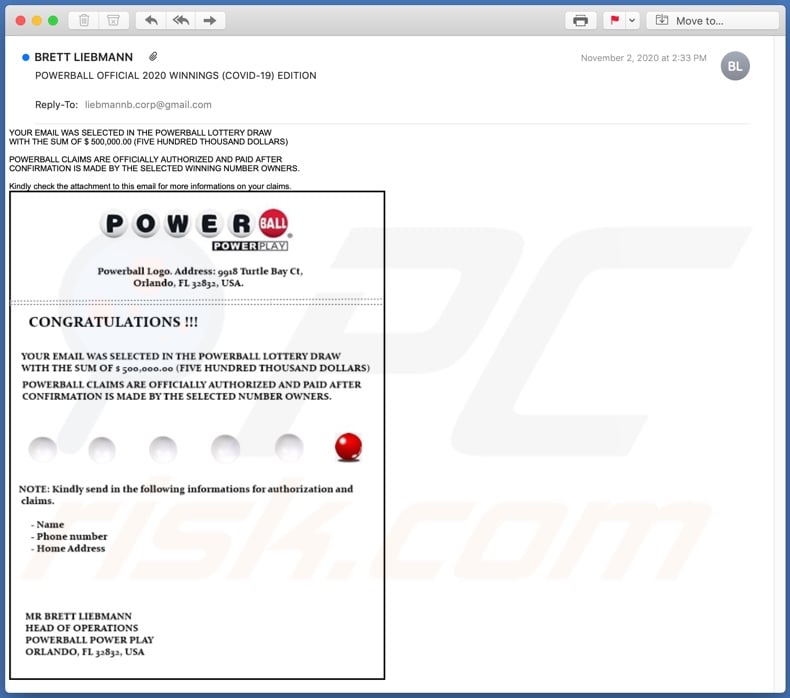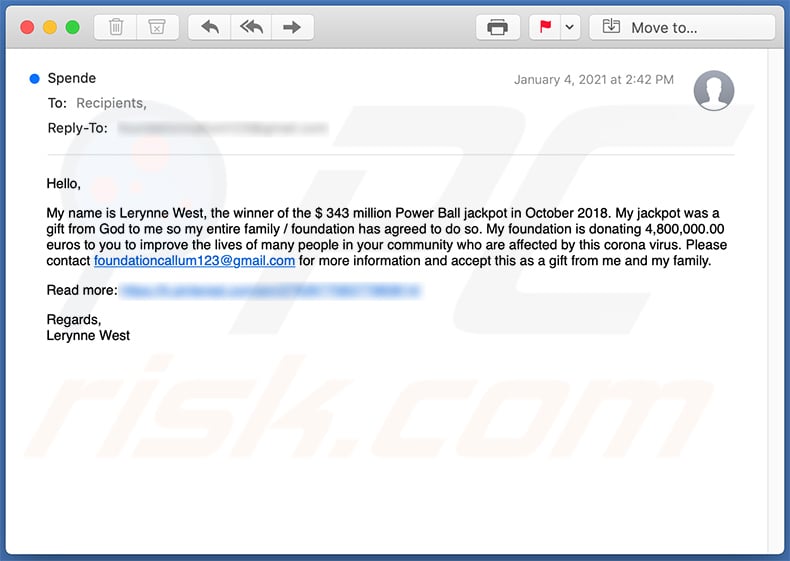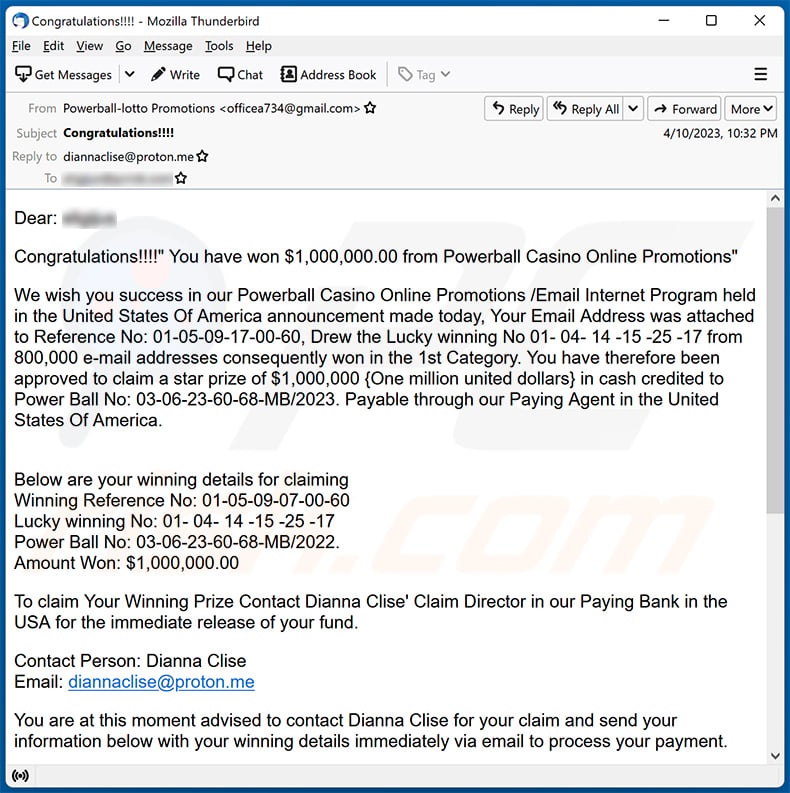How to avoid falling victim to "POWERBALL OFFICIAL 2020 WINNINGS" email
Phishing/ScamAlso Known As: POWERBALL OFFICIAL 2020 WINNINGS spam
Get free scan and check if your device is infected.
Remove it nowTo use full-featured product, you have to purchase a license for Combo Cleaner. Seven days free trial available. Combo Cleaner is owned and operated by RCS LT, the parent company of PCRisk.com.
What is the "POWERBALL OFFICIAL 2020 WINNINGS" email?
"POWERBALL OFFICIAL 2020 WINNINGS" is an email phishing spam campaign. The term "spam campaign" refers to a mass-scale operation, during which thousands of deceptive emails are sent.
The messages distributed through the "POWERBALL OFFICIAL 2020 WINNINGS" spam campaign are disguised as official mail from Powerball, an American lottery game offered by 45 states, the District of Columbia, Puerto Rico, and U.S. Virgin Islands. These scam emails are in no way associated with the genuine lottery and all of the information provided within them is false.
The purpose of this spam campaign is phishing. I.e., the messages are intended to trick recipients into providing their personal information, which can then be potentially used to further this or other scams.

More about the "POWERBALL OFFICIAL 2020 WINNINGS" scam
The "POWERBALL OFFICIAL 2020 WINNINGS" scam emails (title/subject "POWERBALL OFFICIAL 2020 WINNINGS (COVID-19) EDITION" might vary) inform victims that their emails have been selected to participate in the "Powerball" lottery's $500,000.00 dollar draw.
The messages state that the prizes are paid out once winners' confirmations are received. The deceptive emails instruct recipients to check additional information on the claims in the attachment. Recipients are also asked to provide the following information: names, telephone numbers, and home addresses.
The personal details can then be used to further the "POWERBALL OFFICIAL 2020 WINNINGS" scheme or other scams, and are sold to third parties (potentially, cyber criminals). To summarize, trusting this scam can lead to serious privacy issues, financial loss, and even identity theft.
| Name | POWERBALL OFFICIAL 2020 WINNINGS Email Scam. |
| Threat Type | Phishing, Scam, Social Engineering, Fraud. |
| Fake Claim | Scam emails claim that recipients have been selected to participate in the "Powerball" lottery. |
| Disguise | Powerball lottery. |
| Symptoms | Unauthorized online purchases, changed online account passwords, identity theft, illegal access of the computer. |
| Distribution methods | Deceptive emails, rogue online pop-up ads, search engine poisoning techniques, misspelled domains. |
| Damage | Loss of sensitive private information, monetary loss, identity theft. |
| Malware Removal (Windows) |
To eliminate possible malware infections, scan your computer with legitimate antivirus software. Our security researchers recommend using Combo Cleaner. Download Combo CleanerTo use full-featured product, you have to purchase a license for Combo Cleaner. 7 days free trial available. Combo Cleaner is owned and operated by RCS LT, the parent company of PCRisk.com. |
Similar scams in general
"United Nations Online Lotto", "2020 EU/COMMONWEALTH LOTTO", "Attn Lucky Winner" and "TOYOTA LOTTERY ORGANIZATION" are some examples of other spam campaigns similar to "POWERBALL OFFICIAL 2020 WINNINGS".
Scam messages are often disguised as "official", "important", "urgent", "priority" and may even be presented as mail from legitimate institutions, organizations, companies and other enterprises. Note that spam campaigns are not used exclusively for phishing purposes, they are also used for other types of scams and malware (e.g. Trojan, ransomware, etc.) proliferation.
Regardless of what deceptive mail claims, requests, offers, or demands, the purpose is identical: to generate revenue for the scammers/cyber criminals responsible. Therefore, you are strongly advised to exercise caution with incoming emails.
How do spam campaigns infect computers?
Typically, cyber criminals behind malspam campaigns send emails with a file attached to them or a download link to the malicious file. Their main goal is to trick recipients into opening/executing the rogue file, which then installs malicious software.
Some examples of files that cyber criminals send via email are Microsoft Office and PDF documents, executables (.exe), JavaScript, and archives (ZIP, RAR). Note that malicious documents that are opened with Microsoft Office 2010 or newer versions install malicious software only if users enable macros commands (enable editing/content).
These versions include "Protected View" mode, which does not allow opened malicious documents to install malware automatically. Older versions do not include this feature and install malicious software without asking permission.
How to avoid installation of malware
To avoid malware spread via spam mail, you are strongly advised against opening suspicious or irrelevant emails, especially those with any attachments or links present within them. Additionally, use Microsoft Office versions released after 2010.
Malicious programs are also proliferated through untrusted download channels (e.g. unofficial and free file-hosting sites, Peer-to-Peer sharing networks and other third party downloaders), illegal software activation ("cracking") tools, and fake updaters.
Therefore, only download from official/verified sources and activate and update software with tools/functions provided by legitimate developers. To ensure device integrity and user privacy, have a reputable anti-virus/anti-spyware suite installed and kept updated.
Furthermore, use these programs to run regular system scans and to remove detected/potential threats. If you have already opened malicious attachments, we recommend running a scan with Combo Cleaner Antivirus for Windows to automatically eliminate infiltrated malware.
Text presented in the "POWERBALL OFFICIAL 2020 WINNINGS" scam email message:
Subject: POWERBALL OFFICIAL 2020 WINNINGS (COVID-19) EDITION
YOUR EMAIL WAS SELECTED IN THE POWERBALL LOTTERY DRAW
WITH THE SUM OF $ 500,000.00 (FIVE HUNDRED THOUSAND DOLLARS)
POWERBALL CLAIMS ARE OFFICIALLY AUTHORIZED AND PAID AFTER
CONFIRMATION IS MADE BY THE SELECTED WINNING NUMBER OWNERS.
Kindly check the attachment to this email for more informations on your claims.
POWERBALL
POWE RPLAY
Powerball Logo. Address: 9918 Turtle Bay Ct, Orlando, FL 32832, USA.
CONGRATULATIONS !!!
YOUR EMAIL WAS SELECTED IN THE POWERBALL LOTTERY DRAW WITH THE SUM OF $500,00.00 (FIVE HUNDRED THOUSAND DOLLARS)
POWERBALL CLAIMS ARE OFFICIALLY AUTHORIZED AND PAID AFTER CONFIRMATION IS MADE BY THE SELECTED NUMBER OWNERS.
NOTE: Kindly send in the following informations for authorization and claims.
- Name
- Phone number
- Home Address
MR BRETT LIEBMANN
HEAD OF OPERATIONS
POWERBALL POWER PLAY
ORLANDO, FL 32832, USA
Another example of Powerball-themed scam email:

Text presented within:
Subject: Spende
Hello,
My name is Lerynne West, the winner of the $ 343 million Power Ball jackpot in October 2018. My jackpot was a gift from God to me so my entire family / foundation has agreed to do so. My foundation is donating 4,800,000.00 euros to you to improve the lives of many people in your community who are affected by this corona virus. Please contact foundationcallum123@gmail.com for more information and accept this as a gift from me and my family.
Read more: -
Regards,
Lerynne West
Yet another example of Powerball lottery-themed scam email:

Text presented within:
Subject: Congratulations!!!!
Dear: -
Congratulations!!!!" You have won $1,000,000.00 from Powerball Casino Online Promotions"
We wish you success in our Powerball Casino Online Promotions /Email Internet Program held in the United States Of America announcement made today, Your Email Address was attached to Reference No: 01-05-09-17-00-60, Drew the Lucky winning No 01- 04- 14 -15 -25 -17 from 800,000 e-mail addresses consequently won in the 1st Category. You have therefore been approved to claim a star prize of $1,000,000 {One million united dollars} in cash credited to Power Ball No: 03-06-23-60-68-MB/2023. Payable through our Paying Agent in the United States Of America.
Below are your winning details for claiming
Winning Reference No: 01-05-09-07-00-60
Lucky winning No: 01- 04- 14 -15 -25 -17
Power Ball No: 03-06-23-60-68-MB/2022.
Amount Won: $1,000,000.00To claim Your Winning Prize Contact Dianna Clise' Claim Director in our Paying Bank in the USA for the immediate release of your fund.
Contact Person: Dianna Clise
Email: diannaclise@proton.meYou are at this moment advised to contact Dianna Clise for your claim and send your information below with your winning details immediately via email to process your payment.
Full Names/Resident address:
Gender:
City:
Country:
Direct Mobile Cell:
Age:
Occupation:
Alternative Email:
Reference No:This Program is sponsored and supported by the United States Of America/ Lotto Authority.
Congratulations'' Once again from all our Staff and thank you for being part of our promotions program.
Yours Truly,
Promotion Manager
Powerball Casino Online Promotions United States Of America.
Instant automatic malware removal:
Manual threat removal might be a lengthy and complicated process that requires advanced IT skills. Combo Cleaner is a professional automatic malware removal tool that is recommended to get rid of malware. Download it by clicking the button below:
DOWNLOAD Combo CleanerBy downloading any software listed on this website you agree to our Privacy Policy and Terms of Use. To use full-featured product, you have to purchase a license for Combo Cleaner. 7 days free trial available. Combo Cleaner is owned and operated by RCS LT, the parent company of PCRisk.com.
Quick menu:
- What is POWERBALL OFFICIAL 2020 WINNINGS spam?
- Types of malicious emails.
- How to spot a malicious email?
- What to do if you fell for an email scam?
Types of malicious emails:
![]() Phishing Emails
Phishing Emails
Most commonly, cybercriminals use deceptive emails to trick Internet users into giving away their sensitive private information, for example, login information for various online services, email accounts, or online banking information.
Such attacks are called phishing. In a phishing attack, cybercriminals usually send an email message with some popular service logo (for example, Microsoft, DHL, Amazon, Netflix), create urgency (wrong shipping address, expired password, etc.), and place a link which they hope their potential victims will click on.
After clicking the link presented in such email message, victims are redirected to a fake website that looks identical or extremely similar to the original one. Victims are then asked to enter their password, credit card details, or some other information that gets stolen by cybercriminals.
![]() Emails with Malicious Attachments
Emails with Malicious Attachments
Another popular attack vector is email spam with malicious attachments that infect users' computers with malware. Malicious attachments usually carry trojans that are capable of stealing passwords, banking information, and other sensitive information.
In such attacks, cybercriminals' main goal is to trick their potential victims into opening an infected email attachment. To achieve this goal, email messages usually talk about recently received invoices, faxes, or voice messages.
If a potential victim falls for the lure and opens the attachment, their computers get infected, and cybercriminals can collect a lot of sensitive information.
While it's a more complicated method to steal personal information (spam filters and antivirus programs usually detect such attempts), if successful, cybercriminals can get a much wider array of data and can collect information for a long period of time.
![]() Sextortion Emails
Sextortion Emails
This is a type of phishing. In this case, users receive an email claiming that a cybercriminal could access the webcam of the potential victim and has a video recording of one's masturbation.
To get rid of the video, victims are asked to pay a ransom (usually using Bitcoin or another cryptocurrency). Nevertheless, all of these claims are false - users who receive such emails should ignore and delete them.
How to spot a malicious email?
While cyber criminals try to make their lure emails look trustworthy, here are some things that you should look for when trying to spot a phishing email:
- Check the sender's ("from") email address: Hover your mouse over the "from" address and check if it's legitimate. For example, if you received an email from Microsoft, be sure to check if the email address is @microsoft.com and not something suspicious like @m1crosoft.com, @microsfot.com, @account-security-noreply.com, etc.
- Check for generic greetings: If the greeting in the email is "Dear user", "Dear @youremail.com", "Dear valued customer", this should raise suspiciousness. Most commonly, companies call you by your name. Lack of this information could signal a phishing attempt.
- Check the links in the email: Hover your mouse over the link presented in the email, if the link that appears seems suspicious, don't click it. For example, if you received an email from Microsoft and the link in the email shows that it will go to firebasestorage.googleapis.com/v0... you shouldn't trust it. It's best not to click any links in the emails but to visit the company website that sent you the email in the first place.
- Don't blindly trust email attachments: Most commonly, legitimate companies will ask you to log in to their website and to view any documents there; if you received an email with an attachment, it's a good idea to scan it with an antivirus application. Infected email attachments are a common attack vector used by cybercriminals.
To minimise the risk of opening phishing and malicious emails we recommend using Combo Cleaner Antivirus for Windows.
Example of a spam email:

What to do if you fell for an email scam?
- If you clicked on a link in a phishing email and entered your password - be sure to change your password as soon as possible. Usually, cybercriminals collect stolen credentials and then sell them to other groups that use them for malicious purposes. If you change your password in a timely manner, there's a chance that criminals won't have enough time to do any damage.
- If you entered your credit card information - contact your bank as soon as possible and explain the situation. There's a good chance that you will need to cancel your compromised credit card and get a new one.
- If you see any signs of identity theft - you should immediately contact the Federal Trade Commission. This institution will collect information about your situation and create a personal recovery plan.
- If you opened a malicious attachment - your computer is probably infected, you should scan it with a reputable antivirus application. For this purpose, we recommend using Combo Cleaner Antivirus for Windows.
- Help other Internet users - report phishing emails to Anti-Phishing Working Group, FBI’s Internet Crime Complaint Center, National Fraud Information Center and U.S. Department of Justice.
Frequently Asked Questions (FAQ)
Why did I receive this email?
Spammers send identical letters to thousands of people, without personalizing them, in the hope that someone will be tricked into responding and taking further actions.
I have provided my personal information when tricked by this email, what should I do?
In case you have shared any account login details, it is advisable to change all passwords without delay. If you have shared any other personal details, like credit card details or ID card information, it is recommended to get in touch with the relevant authorities at the earliest.
I have downloaded and opened a malicious file attached to an email, is my computer infected?
It is highly likely that the file would have caused an infection if it was executable. However, if it was a document in formats like .pdf or .doc, you might have escaped the malware attack, as merely opening the document does not always lead to system infiltration.
I have sent cryptocurrency to the address presented in such email, can I get my money back?
Unfortunately, it is highly unlikely that you can get your cryptocurrency back if you have sent it to the address provided in a fraudulent email. Cryptocurrency transactions are typically irreversible and operate on a decentralized network, meaning no central authority can reverse or cancel the transfer.
I have read the email but did not open the attachment, is my computer infected?
Merely opening an email is safe and harmless. It is the act of clicking on links or opening attachments within the email that can cause system infections.
Will Combo Cleaner remove malware infections that were present in email attachment?
Combo Cleaner can detect and remove nearly all types of known malware infections. It is important to note that sophisticated malware can conceal itself deeply within the system. Therefore, running a full scan is necessary to ensure the malware is completely eliminated.
Share:

Tomas Meskauskas
Expert security researcher, professional malware analyst
I am passionate about computer security and technology. I have an experience of over 10 years working in various companies related to computer technical issue solving and Internet security. I have been working as an author and editor for pcrisk.com since 2010. Follow me on Twitter and LinkedIn to stay informed about the latest online security threats.
PCrisk security portal is brought by a company RCS LT.
Joined forces of security researchers help educate computer users about the latest online security threats. More information about the company RCS LT.
Our malware removal guides are free. However, if you want to support us you can send us a donation.
DonatePCrisk security portal is brought by a company RCS LT.
Joined forces of security researchers help educate computer users about the latest online security threats. More information about the company RCS LT.
Our malware removal guides are free. However, if you want to support us you can send us a donation.
Donate
▼ Show Discussion